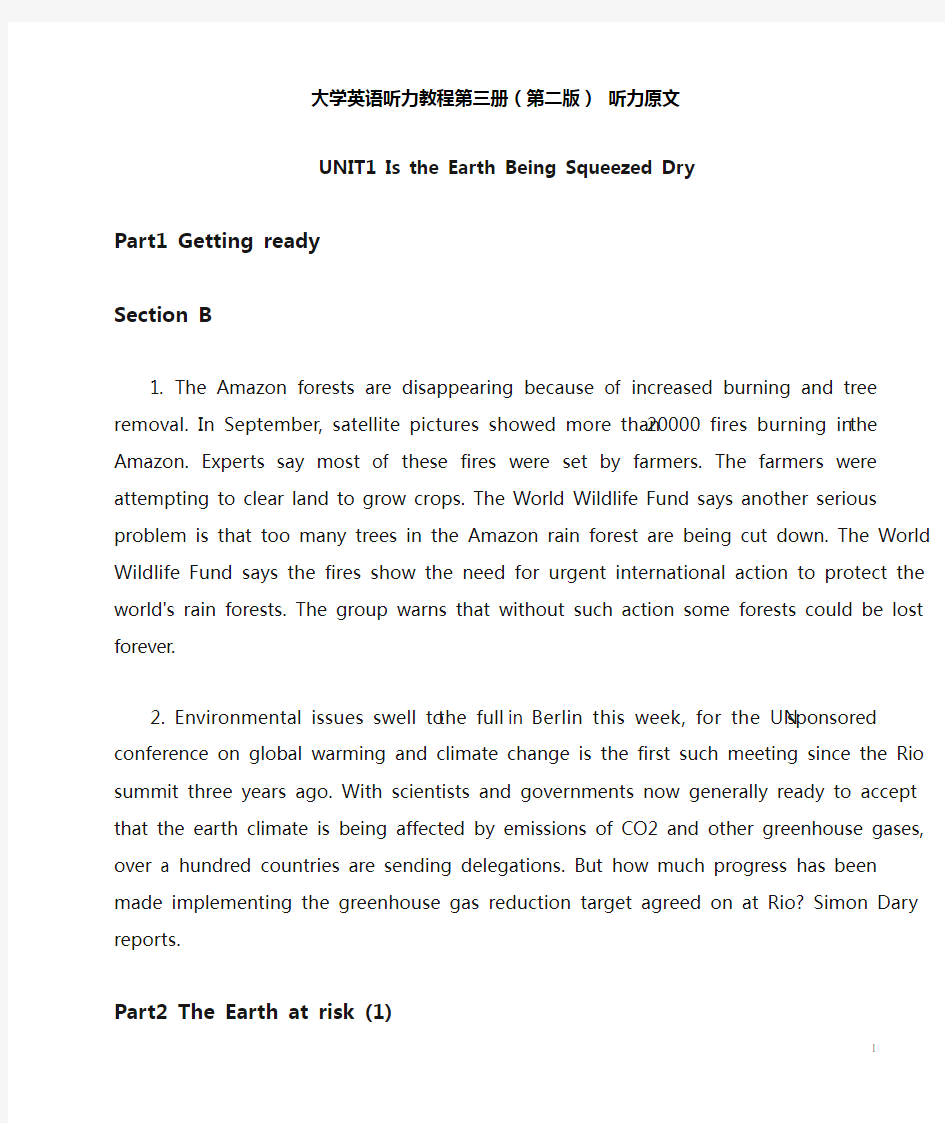大学英语听力教程第三册听力原文(第二版_张民伦主编)

- 1、下载文档前请自行甄别文档内容的完整性,平台不提供额外的编辑、内容补充、找答案等附加服务。
- 2、"仅部分预览"的文档,不可在线预览部分如存在完整性等问题,可反馈申请退款(可完整预览的文档不适用该条件!)。
- 3、如文档侵犯您的权益,请联系客服反馈,我们会尽快为您处理(人工客服工作时间:9:00-18:30)。
大学英语听力教程第三册(第二版)听力原文
UNIT1 Is the Earth Being Squeezed Dry
Part1 Getting ready
Section B
1. The Amazon forests are disappearing because of increased burning and tree removal. In September, satellite pictures showed more than 20000 fires burning in the Amazon. Experts say most of these fires were set by farmers. The farmers were attempting to clear land to grow crops. The World Wildlife Fund says another serious problem is that too many trees in the Amazon rain forest are being cut down. The World Wildlife Fund says the fires show the need for urgent international action to protect the world's rain forests. The group warns that without such action some forests could be lost forever.
2. Environmental issues swell to the full in Berlin this week, for the UN sponsored conference on global warming and climate change is the first such meeting since the Rio summit three years ago. With scientists and governments now generally ready to accept that the earth climate is being affected by emissions of CO2 and other greenhouse gases, over a hundred countries are sending delegations. But how much progress has been made implementing the greenhouse gas reduction target agreed on at Rio? Simon Dary reports.
Part2 The Earth at risk (1)
I: Brian Cowles is the producer of a new series of documentaries called "The Earth at Risk" which can be seen on Channel 4 later this month. Each program deals with a different continent, doesn't it, Brian?
B: That's right. We went to America, both North and South and then we went over to Africa and South-East Asia.
I: And what did you find in each of these continents?
B: Starting with Africa, our film shows the impact of the population on the environment. Generally speaking, this has caused the Sahara Desert to expand. It's a bit of a vicious circle we find. People cut down trees for firewood and their domestic animals eat all the available plants — and so consequently they have to move south as the Sahara Desert expands further south. I mean, soon the whole of Mali will become a desert. And in East Africa: here the grasslands are supporting too many animals and the result is, of course, there's no grass — nothing for the animals to eat.
I: I see. And the next film deals with North America?
B: That's right. In the USA, as you know, intensive agriculture requires a plentiful supply of rain for these crops to grow; I mean if there isn't enough rain the crops don't grow. And growing crops stabilize soil, without them the top soil just blows away. This is also true for any region that is intensely farmed — most of Europe, for example.
I: And what did you find in South America?
B: In South America (as in Central Africa and Southern Asia) tropical forests are being cut down at an alarming rate. This is done so that people can support themselves by growing food or to create ranches where cattle can be raised to be exported to Europe or America as tinned meat. The problem is that the soil is so poor that only a couple of harvests are possible before this very thin soil becomes exhausted. And it can't be fed with fertilizers like agricultural land in Europe. For example, in Brazil in 1982 an area of jungle the size of Britain and France combined was destroyed to make way for an iron ore mine. Huge numbers of trees are being cut down for exports as hardwood to Japan, Europe, USA to make things like luxury furniture. These forests can't be replaced — the forest soil is thin and unproductive and in just a few years, a jungle has become a waste land. Tropical forests contain rare plants (which we can use for medicines, for example) and animals — one animal or plant species becomes extinct every half hour. These forest trees also have worldwide effects. You know, they convert carbon dioxide into oxygen. The consequence of destroying forests is not only that the climate of that region changes (because there is less rainfall) but this change affects the whole world. I mean, over half the world's rain forest has been cut down this century.
Part3 The Earth at risk (2)
Section A
I: So, Brian, would you agree that what we generally think of as natural disasters are in fact man-made?
